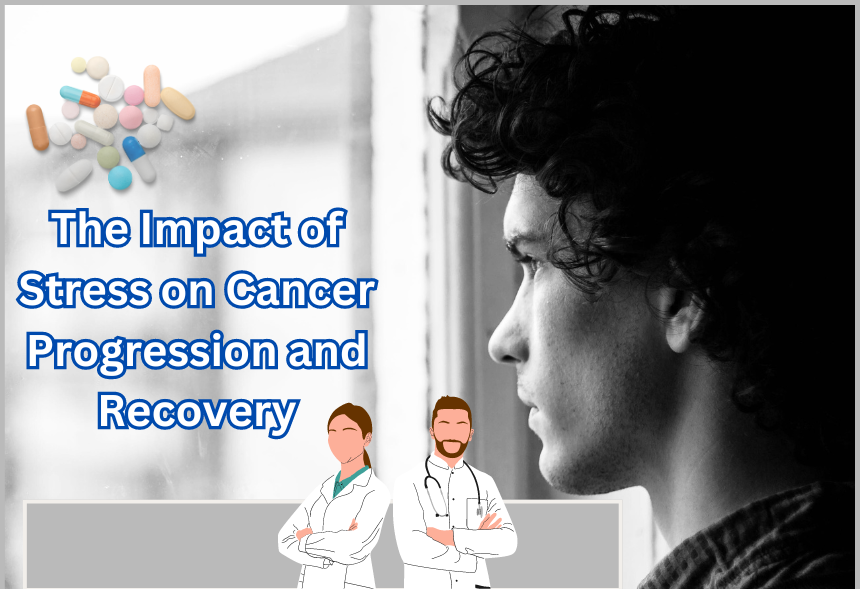BLOG
The Impact of Stress on Cancer Progression and Recovery

In the modern world, stress has become a pervasive part of daily life. From work pressures to personal responsibilities, people face stress from multiple directions. But how does this relentless stress impact those dealing with cancer? Understanding the relationship between stress and cancer progression and recovery is crucial, as it can inform both prevention strategies and treatment approaches. This blog delves into the intricate connection between stress and cancer, shedding light on its significant implications.
Understanding Stress and Its Biological Impact
Stress triggers a cascade of physiological responses in the body, primarily driven by the release of hormones like cortisol and adrenaline. While these hormones are essential for the “fight or flight” response, chronic stress leads to prolonged exposure to them, which can disrupt various bodily functions. The immune system, which plays a pivotal role in defending the body against diseases including cancer, is particularly vulnerable to the detrimental effects of chronic stress.
The Link Between Stress and Cancer Progression
Research has shown that stress can influence cancer progression in several ways:
- Immune System Suppression: Chronic stress suppresses the immune system’s ability to function optimally. This can hinder the body’s capacity to fight off cancer cells, allowing them to grow and spread more easily.
- Inflammation: Stress induces inflammation, a known factor in cancer development and progression. Inflammatory responses can create an environment conducive to cancer cell growth and metastasis.
- Hormonal Influence: Stress-related hormones, such as norepinephrine, have been found to stimulate cancer cell growth and spread. These hormones can promote angiogenesis, the formation of new blood vessels that supply tumors with nutrients, aiding in their growth.
- Behavioral Factors: Stress often leads to unhealthy behaviors such as poor diet, lack of exercise, smoking, and alcohol consumption. These behaviors can further exacerbate cancer progression.
The Psychological Toll of Cancer Diagnosis and Treatment
Receiving a cancer diagnosis is an incredibly stressful event. The uncertainty, fear, and physical discomfort associated with cancer and its treatment can significantly impact a patient’s mental health. Depression, anxiety, and chronic stress are common among cancer patients, and these psychological factors can negatively influence treatment outcomes.
- Adherence to Treatment: Stress and depression can lead to poor adherence to treatment regimens. Patients may miss appointments, skip medications, or fail to follow dietary and lifestyle recommendations, reducing the effectiveness of their treatment.
- Quality of Life: High levels of stress and anxiety can diminish a patient’s quality of life, making it harder to cope with the physical and emotional challenges of cancer. A poor quality of life can, in turn, affect the overall prognosis.
- Biological Responses: Psychological stress can trigger biological responses that impact cancer progression. For instance, stress can lead to the activation of signaling pathways that promote tumor growth and metastasis.
Stress Management and Cancer Recovery
Given the significant impact of stress on cancer progression and recovery, effective stress management strategies are crucial for cancer patients. These strategies can help mitigate the negative effects of stress and improve overall outcomes.
- Psychological Support: Counseling, therapy, and support groups can provide essential emotional support. Talking to a mental health professional can help patients develop coping strategies, manage anxiety, and improve their overall mental health.
- Mind-Body Techniques: Practices such as yoga, meditation, and deep breathing exercises can help reduce stress and promote relaxation. These techniques can lower cortisol levels, reduce inflammation, and improve immune function.
- Physical Activity: Regular exercise is a powerful stress-reliever. It releases endorphins, which are natural mood lifters, and helps improve physical health, which can positively impact cancer treatment and recovery.
- Healthy Lifestyle Choices: Maintaining a balanced diet, getting adequate sleep, and avoiding harmful habits such as smoking and excessive alcohol consumption are crucial. These choices can help strengthen the body’s defenses against cancer and improve overall well-being.
- Medical Interventions: In some cases, medications may be necessary to manage severe anxiety or depression. Anti-anxiety medications, antidepressants, and other treatments can be part of a comprehensive stress management plan.
The Role of Healthcare Providers
Healthcare providers play a vital role in addressing the stress-cancer connection. By incorporating stress assessments into routine care, providers can identify patients at risk and offer appropriate interventions. Multidisciplinary approaches that include oncologists, mental health professionals, nutritionists, and fitness experts can provide holistic care that addresses both the physical and psychological needs of cancer patients.
Conclusion
The impact of stress on cancer progression and recovery is profound and multifaceted. Chronic stress can suppress the immune system, promote inflammation, and influence hormonal pathways, all of which can accelerate cancer growth. Conversely, effective stress management can enhance treatment adherence, improve quality of life, and potentially improve cancer outcomes. By understanding and addressing the intricate link between stress and cancer, patients, caregivers, and healthcare providers can work together to foster better health and recovery.More

